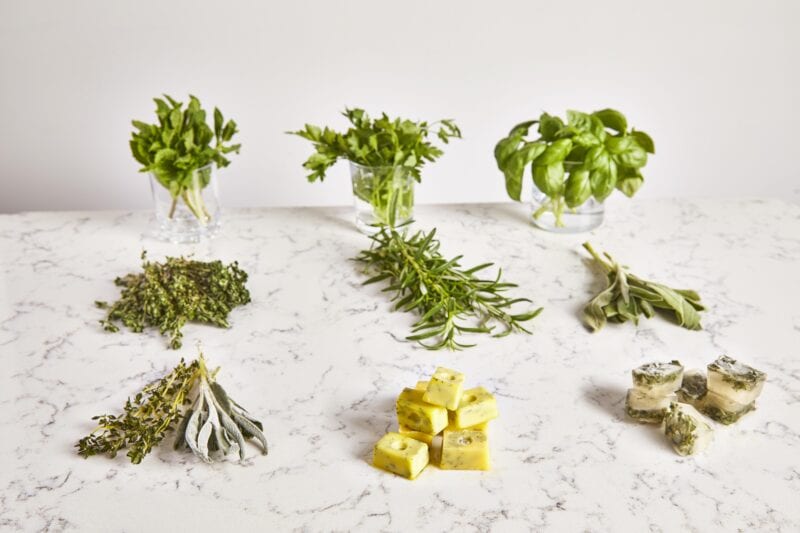How To Make Your Fresh Herbs Last Longer

Fresh herbs are a magical ingredient. I’ve yet to meet a meal that couldn’t be greatly improved by the addition of a few choice sprigs of the right herb. The only drawback is that fresh herbs don’t stay fresh for very long.
If you’re a seasoned cook (pun intended) you’ll know all too well the bitter business of reaching into the fridge to fetch a bag of “fresh” coriander only to find half the bunch is now a gross, soggy mess of wasted flavour potential. And although a single bunch of soggy coriander may seem like no big deal, the amount of food wasted in UK homes each year adds up to a big problem.
Luckily our team of chefs have picked a few fresh tips to keep your parsley, sage and rosemary from expiring before their …thyme.
Storing Your Fresh Herbs
 Hardy fresh herbs like basil and mint do best at room temperature. Store them in a loose plastic bag in a kitchen cupboard or trim the stems and keep them in a jar of cool water on a window sill.
Hardy fresh herbs like basil and mint do best at room temperature. Store them in a loose plastic bag in a kitchen cupboard or trim the stems and keep them in a jar of cool water on a window sill.
Soft, leafy fresh herbs like coriander, dill, parsley and chives need to be chilled. Store in a loose plastic bag in the fridge.
Woody fresh herbs like oregano, rosemary, dill, sage, thyme do best when slightly moist. Wrap in a damp (not soggy) piece of kitchen roll and store in a loose plastic bag in the fridge.
Top tip: Don’t wash your herbs until you’re ready to use them. This will keep them fresh much longer
Can you freeze fresh herbs?
 Yes! Sturdier herbs like basil, chives, oregano and rosemary can be frozen whole. Just chop them up, arrange them in a single layer on a baking tray and pop them in the freezer. Once frozen, gather them up and keep them in a freezer bag to save on space. They’ll be ready to use and full of flavour when you need them. Herbs frozen in this way will last six months in the freezer.
Yes! Sturdier herbs like basil, chives, oregano and rosemary can be frozen whole. Just chop them up, arrange them in a single layer on a baking tray and pop them in the freezer. Once frozen, gather them up and keep them in a freezer bag to save on space. They’ll be ready to use and full of flavour when you need them. Herbs frozen in this way will last six months in the freezer.
Top tip: Although frozen herbs taste fresh when cooked, they won’t look as pretty after being frozen so they work best in dishes where presentation isn’t an issue. For example, frozen basil works a treat in pasta sauces but frozen mint is not recommended in salads. Always use fresh for those fancy garnishes.
My favourite way to store fresh herbs (and the most long-lasting way) is to freeze them into ice cube trays with a little cooking oil or melted butter. To do this simply chop up your fresh herbs (including the stalks for soft herbs and discarding the stalks for woody herbs), add two tablespoons of chopped herbs to each cube of an ice cube tray, fill the cube with cooking oil or melted butter and freeze. Then, when it comes to cooking, you can add the cubes directly to the pan!
What’s the best way to store garlic & ginger?
 Store whole heads of garlic in a cool, dark place like a kitchen cupboard. If they start sprouting, don’t worry, you can still use them!
Store whole heads of garlic in a cool, dark place like a kitchen cupboard. If they start sprouting, don’t worry, you can still use them!
Whole, unpeeled ginger root will last longest stored in a resealable plastic bag, with as little air as possible, in a drawer in the fridge. Make sure you blot any cut off parts with kitchen roll beforehand.
What’s the best way to store onions?
Store whole onions in a cool, dark place like a kitchen cupboard, away from potatoes (they give off a gas that ripens onions).
How about spring onions?
There are two ways to store spring onions depending on whether you want them to keep growing or not. If you do, put them in a jar with an inch of water covering the roots, then keep the jar on a windowsill. If you don’t want them to grow, wrap the roots in damp kitchen roll, pop it in a little plastic bag and keep in the fridge.
And there you have it! Hopefully, these tips will help your fresh herb habit and with any luck, help you reduce your food waste. To read more about food waste, check out our posts 12 Food Scraps You Didn’t Know Were Edible and 7 Foods You Didn’t Know You Could Freeze. Are there any herb storage methods you swear by? Let us know in the comments!

 MENU
MENU CLOSE
CLOSE